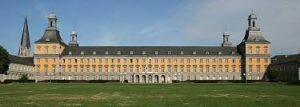University of Bonn
Situated in Bonn, Germany, the institution of Bonn, formally known as Rheinische Friedrich-Wilhelms-Universität Bonn, is a significant public research institution. Here are some essential specifics:

The History:
Foundation: Friedrich Wilhelm III, the King of Prussia, founded the university in 1818. Its original goal was to advance higher education in the area, and it went on to become one of Germany’s top educational establishments .
Evolution: The University of Bonn has developed and changed with the times, adding new academic programs and integrating cutting-edge research facilities.
The Campus:
Main Campus: Located in the center of Bonn, the central campus, also referred to as the “Poppelsdorf Campus,” is home to a number of important departments and administrative offices.
Historic Structures: The campus is home to a number of historic structures, including the Hauptgebäude, the university’s main building, which is renowned for its classical design and is frequently utilized for formal occasions.
sophisticated Facilities: The university also has state-of-the-art labs, student amenities, and sophisticated research buildings.
Academic Structure:
Departments and Faculties: There are nine faculties within the institution, and each one offers a variety of departments and specialized programs.
Faculty of Law: Contains research centers devoted to different facets of law and focuses on legal studies.
Faculty of Medicine: Well-known for clinical practice and medical research, it is home to the University Hospital Bonn.
Departments include mathematics, physics, chemistry, and biology are part of the Faculty of Mathematics and Natural Sciences.
The Faculty of Economics and Social Sciences provides courses in sociology, economics, and sociology, political science, and related field.
Research and Excellence:
Research Centers: The university is home to a large number of institutions and centers. The Bonn Center for Dependency and Slavery Studies focuses on both modern and historical instances of slavery and reliance.
Internationalization:
The University of Bonn is involved in numerous international partnerships with academic institutions and research centers all around the world.
Exchange Programs: To promote international academic interaction, a number of exchange programs and collaborative research projects are in place.
English-Taught Programs: To accommodate international students and foster global involvement, a large number of graduate programs and certain undergraduate courses are taught in English.

































